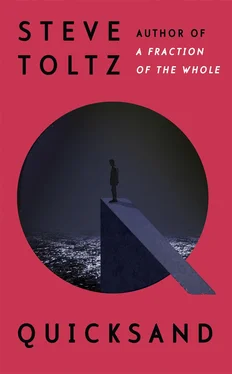We moved around into the backyard where the roots of an enormous tree had broken the terracotta tiles. From here the peak of the neighbour’s turret was visible. Aldo stepped up onto the porch and rattled the French-door handles. Locked.
‘We always put the key above the frame.’ He reached for the key, but thankfully there wasn’t one.
‘That was my bedroom,’ he said, pointing up. ‘I used to smoke out that window every night and pray to Zeus and Apollo to return Veronica from Hades or else to bring me celestial nymphs — I was really into Greek mythology back then.’ Aldo went on about how the sadistic ambushes and the use of enchantment and the monstrous libidos of these immortal gods rang true, at least to him. I lowered myself into a wooden chair covered in dried bird shit and contemplated how, from a certain angle, I could identify every personality defect in my best friend.
‘You see,’ he said, ‘my parents bought this house two years after they were married, but it was Henry’s brother, Brett, who started it all.’
‘Started what?’ I asked.
Aldo’s uncle Brett — who lived the better part of his later years in a swivel chair and then went camping by himself one New Year’s Eve and died of a burst appendix — had always urged Aldo to accompany him down to the basement, which was spookier than most catacombs, where he’d swear himself to secrecy then ask Aldo about his sexual awakening, and then, over dinner, repeat his answers to the rest of the family, to their sickening laughter. It was Brett and his wife Cynthia, whose hatred of the saxophone was only equalled by Brett’s proficiency in — what else? — the saxophone, who started the colonisation of the neighbourhood, or the Benjamin Sprawl as they called it, when they bought the house next door. They were followed by paternal grandparents, a truckload of cousins, and copious uncles and aunts who, one by one, as the neighbours moved out, moved in. And that was why there were unsubstantiated complaints to the police that the family had intimidated the neighbours into selling — though while the Benjamins were one of those families where at least one person per generation gets himself into monumental debt and tries to fake his own death, they were not essentially criminals. Yet because Aldo’s big-bellied, overtattooed cousins spent all day in the street teaching their under-age children to drive cars, and because they were now well and truly entrenched in the neighbourhood — sharing fences and tossing packets of sugar over them, waving to one another from opposite windows — the nightly family gatherings became mobile. They moved through the streets like a people on strike, hollering to each other, chairs under their arms or in wheelbarrows, eating dinner in one house, dessert in another. They renovated each other’s abodes, and on birthdays and at christenings and recitals, on Friday afternoons and all through the weekends, they were in one backyard or another with naked children everywhere and babies dangling from every breast, and there were out-of-control dogs and too many cats and driveways crammed with cars and someone was invariably blocking someone else in. ‘You could always hear it: “You’ve blocked me in!” “Who’s blocked me in?” “I’m blocked in!”’ All this could be misinterpreted by a certain sort of mind, Aldo supposed, as intimidation.
At this point, I had to restrain thoughts of my own childhood. Reminiscing is contagious.
‘Anyway, the funny part of it was that the routine complaints that we’d intimidated the neighbours into selling inevitably gave way to the idea that we should intimidate the neighbours into selling. We did this a few times,’ Aldo said, in a slightly thrilled voice. ‘Let rats out in a backyard, made frightening noises, played heavy metal, but our favourite was to gather at the door of a neighbour’s house and stand there staring silently, even the children, twenty or thirty of us glaring wide-eyed with dreamy ferocity through the front windows, like some deranged inhabitants of a village of the damned.’
I said, ‘You did what?’
‘We very rarely descended into actual violence, the idea was simply to make the owners feel uneasy in their own homes.’
‘Oh, sure.’
‘Normally they’d call the police and we’d just retire into the garden next door and deny everything. Then the next day we’d be back again, a beast with a hundred fairly good-looking heads.’
‘I see.’
‘So in one of these intimidation sessions, we gathered outside number seventy-seven,’ he said, in a voice that flared up and died out like a cough in an empty cinema. ‘We had decided on standing in a semicircle and inching forward every ten minutes or so. We were aiming, if the owners looked out their windows sporadically, for a strange jump-cut effect. You get it?’
‘Amusing.’
‘We thought so too. I remember asking my dad how long we had to keep standing like that, and he said, ‘Just another twenty minutes or so and we’ll call it a day.’ Then the door opened and out stepped a tall, gangly man with improbably long sideburns and maybe the smallest mouth I’d ever seen on an adult. He said, ‘My name’s Howard.’ Uncle Brett asked if he had reconsidered our offer. He asked what we were offering. ‘Market price,’ we all said together. Howard laughed a laugh that I thought would cost him sexual partners. He said, ‘Can you wait a few more minutes? My niece just put the kettle on,’ and he kept peering inside as if waiting for something to happen. I started having the feeling that we were being set up, but nothing happened other than the near-medical impossibility that in all this time nobody in my whole gabby family said a word. Then a dark-haired woman came out who I thought was his wife, but I later learned she was his sister, and that the middle-aged siblings lived together in this, their childhood home.’
I shuddered. Adult siblings who live together are a special case in our society. We are right to be afraid of them.
‘The door opened wider and the niece came out and stood there in the evening sun exchanging multilayered glances with her uncle, and some cousin behind me was cracking his knuckles and I couldn’t take my eyes off her, this creature with the dark eyebrows and nose ring and bleached dreads who looked like one of those girls who’d come out of a violent bout of acne scar-free but with a permanent expression of hurt surprise and no concept of how beautiful she was. Her uncle was mouthing words under his breath, maybe doing a headcount, and the sun seemed to be setting inside the leaves and everyone was frozen in a stare-off, and finally the niece was staring right at me with an intensity that carried the promise of misconduct, when her uncle said, ‘Stella, these are our neighbours,’ and opened his front door fully, and Stella said, ‘Won’t you please come in.’ Nobody did. They all turned and went home. Except me.’
UNDER THE STORMWATER BLUE OF THE NIGHT sky, dangling our feet off our favourite toilet block roof at the tennis courts, Aldo was eating a Chiko Roll with weird solemnity and talking about how I should have my sights set on a local beauty with one predominant physical flaw — an aspiring teen model with terrible skin, for instance — before getting totally worked up about his fear that if he ever got a girl pregnant he’d be the type of father who’d accidentally ash on his own baby.
‘You seem stressed,’ I said.
‘I’m eighteen this year.’
‘Mine’s in two months. So?’
‘So,’ he said, glumly, ‘soon we can be tried as adults.’
I laughed. Aldo turned his red eyes mournfully on me, as if I’d failed the bid for mutual understanding. I looked up at the moon that spread a weak light over everything. He held up the fried thing he was eating. ‘There is no food group to which this belongs.’
Читать дальше











